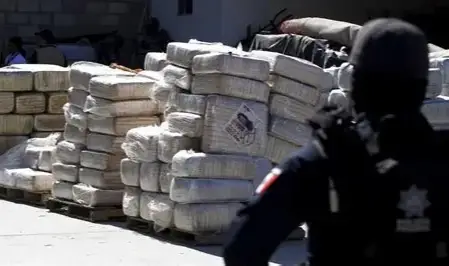Unlike the complicit paralysis of the López Obrador administration to allow organized crime to operate—with which the governors aligned themselves—the hour of truth has begun.
President Claudia Sheinbaum read the letter to the governors, and it will be clear who is who in the fight against crime; the pretense and complicity will end.
Sheinbaum thus managed to commit the states to strengthening public security institutions and reaching an agreement for the search for missing persons.
She thus cornered indolent state leaders, and those who maintain complicity with criminal groups to co-govern.
Executive leaders in states such as Rubén Rocha Moya in Sinaloa; Evelyn Salgado in Guerrero; and Américo Villarreal in Tamaulipas were left up against the wall.
Alfonso Madrazo in Sonora; Marina del Pilar Ávila Olmeda in Baja California; Libia Dennise García Muñoz Ledo, from Guanajuato; Delfina Gómez Álvarez, from the State of Mexico; David Monreal Ávila, from Zacatecas, mainly.
A state like Tabasco, which has been unable to arrest Hernán Bermúdez, the former Secretary of Public Security in the government of Adán Augusto López Hernández, is in the eye of the storm because the criminal group La Barredora continues to sweep away enemy gangs.
A similar case is occurring in Puebla, where the criminal group La Barredora, despite the arrest of some of its members, continues to inflict terror with atrocious crimes.
But not only that, as in other states, other criminal groups are beginning to emerge, such as La Familia Michoacana, dedicated to extorting merchants in the Historic Center, using the 5 de Mayo Market as a base to displace Fuerza 2000.
But it’s not just La Barredora and La Familia Michoacana that operate; Federal authorities dismantled clandestine laboratories in La Calera where the Sinaloa cartel manufactured synthetic drugs; and various criminal gangs have also spread terror.
The governor of Puebla, the state SSP, and the Attorney General’s Office have made a commitment to the president in the agreements signed during the session of the National Public Security Council (CNSP).
There are many tasks, and we will see what the vice admiral in charge of the SSP and the attorney general are up to, with the commitments of the “declaration of war on the cartels,” as published in the regime’s official gazette.
The governor, the Secretary of Security, and the Attorney General face long work days to fulfill their commitments to combat crime, including:
Increasing the strength of the state police and investigative forces by 25 percent; as well as the FGE public prosecutor’s office by 30 percent; Creation of the Anti-Extortion Prosecutor’s Office; the National Registry of Crime Incidence with a new daily reporting methodology for the crime of intentional homicide.
In the national agreement for the search for missing persons, the government and the FGE must increase institutional capacities for investigation and search, as well as for forensic management.
The Attorney General’s Office and the National Search Commission will update the Standardized Investigation Protocol and the Standardized Protocol for the Search for Persons.
The challenge is greater in light of the commitments between the governments of the US and Mexico, with the visit of Marco Rubio, Secretary of State: a relentless fight against fuel theft, and Puebla is a state that feeds the fuel for fuel theft through Pemex.

Source: oem



